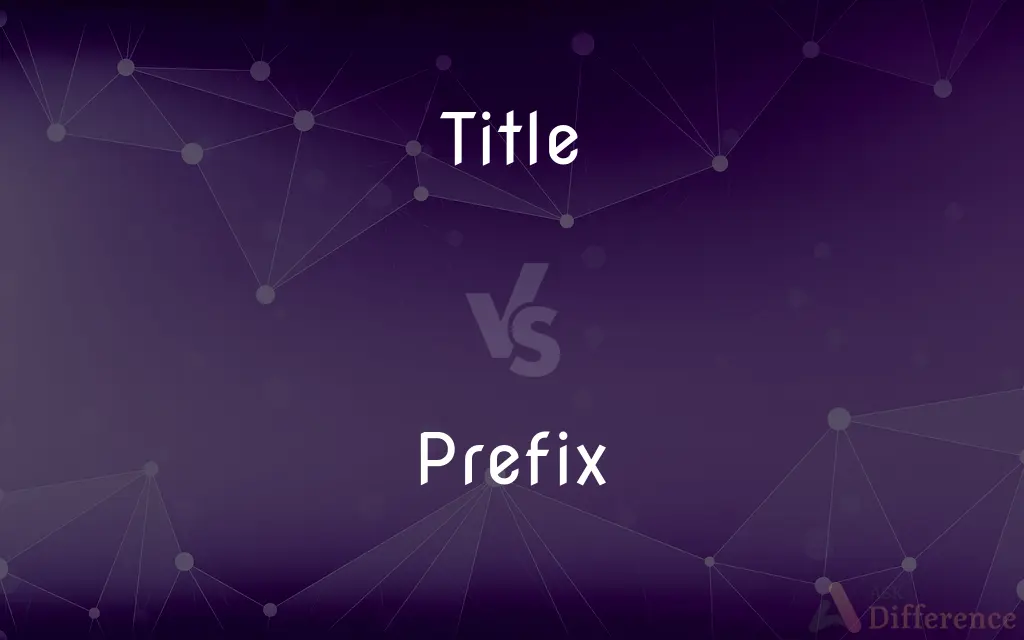Title vs. Prefix — What's the Difference?
By Tayyaba Rehman — Updated on September 18, 2023
"Title" refers to a name that describes someone's position or a work's name, while "Prefix" is a word or element placed before another word to modify its meaning. Both can precede names but serve different functions.

Difference Between Title and Prefix
Table of Contents
ADVERTISEMENT
Key Differences
"Title" and "Prefix" both can appear before names, but they have distinct roles. A "Title" often refers to a person's rank, job position, or a form of address, whereas a "Prefix" is a linguistic element attached before a word to alter its meaning or create a new word.
When considering books, movies, or other works, a "Title" is the name given to that particular piece. In contrast, "Prefix" doesn't relate to this context, as it's primarily about word formation and not naming.
In addressing individuals, one might use "Title" as in "Doctor," "Professor," or "Captain" to show respect or indicate their profession. A "Prefix," in personal names, could be "Mr.," "Mrs.," or "Ms.," specifying gender or marital status.
In linguistics, a "Prefix" like "un-" can change the meaning of a word, turning "happy" into "unhappy." A "Title," on the other hand, doesn't alter word meanings but provides information or recognition.
In daily communication, using the correct "Title" ensures proper respect and acknowledgment, while understanding "Prefix" helps in comprehending and forming words correctly.
ADVERTISEMENT
Comparison Chart
Primary Function
Indicates rank, position, or name of a work
Modifies or changes the meaning of a word
Usage in Names
Dr., Captain, Lord, etc.
Mr., Mrs., Ms., etc.
Examples
"Title" of a book, movie
"Prefix" in "unhappy," "redo"
Contexts
Literature, professions, honors
Linguistics, word formation
Typical Positions
Can stand alone or be placed before names
Always placed before other words
Compare with Definitions
Title
A name given to a book, film, or other work.
The title of the movie was captivating.
Prefix
An affix that is added to the beginning of a word.
Pre- is a prefix in the word prejudice.
Title
A designation associated with a person's job or status.
Her title at the company is Chief Financial Officer.
Prefix
A title placed before a name, denoting gender or marital status.
The prefix Mr. is commonly used before a man's surname.
Title
An official position or rank.
He holds the title of Captain in the army.
Prefix
An element in numbering or naming sequences.
The prefix bi- in bicycle indicates two.
Title
A formal appellation preceding a person's name.
Titles such as Sir or Lady denote knighthood.
Prefix
A word element placed before another word to modify its meaning.
The prefix un- in undo means not.
Title
A title is one or more words used before or after a person's name, in certain contexts. It may signify either generation, an official position, or a professional or academic qualification.
Prefix
A term used in linguistics to describe word formation.
The prefix anti- suggests opposition or against.
Title
The name of a book, composition, or other artistic work
The author and title of the book
Prefix
A prefix is an affix which is placed before the stem of a word. Adding it to the beginning of one word changes it into another word.
Title
A name that describes someone's position or job
Leese assumed the title of director general
Prefix
To put or attach before or in front of.
Title
The position of being the champion of a major sports competition
Davis won the world title for the first time in 1981
Prefix
(prē-fĭks) To settle or arrange in advance.
Title
A right or claim to the ownership of property or to a rank or throne
The buyer acquires a good title to the goods
A grocery family had title to the property
Prefix
To add as a prefix.
Title
(in church use) a fixed sphere of work and source of income as a condition for ordination.
Prefix
To add a prefix to.
Title
Give a name to (a book, composition, or other work)
A report titled The Lost Land
Prefix
(Grammar) An affix, such as dis- in disbelieve, attached to the front of a word to produce a derivative word or an inflected form.
Title
An identifying name given to a book, play, film, musical composition, or other work.
Prefix
A letter, word, abbreviation, or number placed before a name, address, or other identifying label to indicate class or category
You have to indicate on the form whether you prefer the prefix Mr., Ms., or Dr.
Title
A general or descriptive heading, as of a book chapter.
Prefix
Something placed before another
Title
A written work that is published or about to be published
The titles in the publisher's fall catalog.
Prefix
A morpheme added to the beginning of a word to modify its meaning, for example as, pre- in prefix, con- in conjure, re- in reheat, etc.
Title
A division of a legal code, generally consisting of multiple related statutes.
Prefix
(telecommunications) A set of digits placed before a telephone number, to indicate where the number is based, what type of phone number it is (landline, mobile, toll-free, premium rate etc.)
In the UK, a number with an 0800 prefix is a toll-free number.
Add the prefix +34 to dial a Spanish number from abroad
Title
Often titles Written material to be read by viewers that is included in a film or television show, typically presenting credits, narration, or dialogue.
Prefix
A title added to a person's name, such as Mr. or Dr.
Title
A written piece of translated dialogue superimposed at the bottom of the frame during a film; a subtitle.
Prefix
(computing) An initial segment of a string of characters.
The string "abra" is both a prefix and a suffix of the string "abracadabra".
Title
A formal appellation attached to the name of a person as a sign of office, rank, profession, or hereditary privilege.
Prefix
(transitive) To determine beforehand; to set in advance.
Title
A descriptive name; an epithet
The dubious title of the worst bowler in the league.
Prefix
(transitive) To put or fix before, or at the beginning of something; to place at the start.
Title
A right or claim, or the basis of a right or claim
"The weight of a fish is commonly its only title to fame" (Henry David Thoreau).
Prefix
To put or fix before, or at the beginning of, another thing; as, to prefix a syllable to a word, or a condition to an agreement.
Title
A form of ownership free of valid claims by other parties.
Prefix
To set or appoint beforehand; to settle or establish antecedently.
And now he hath to her prefixt a day.
Title
The aggregate evidence that gives rise to a legal right of possession or control.
Prefix
That which is prefixed; esp., one or more letters or syllables combined or united with the beginning of a word to modify its signification; as, pre- in prefix, con- in conjure.
Title
The instrument, such as a deed, that constitutes this evidence.
Prefix
An affix that added in front of the word
Title
Sports & Games A championship
Which boxer won the heavyweight title?.
Prefix
Attach a prefix to;
Prefixed words
Title
A source of income or area of work required of a candidate for ordination in the Church of England.
Title
A Roman Catholic church in or near Rome having a cardinal for its nominal head.
Title
To give a name or title to.
Title
An appellation given to a person or family to signify either veneration, official position, social rank, the possession of assets or properties, or a professional or academic qualification. See also :Category:Titles
Title
(property law) Legal right to ownership of a property; a deed or other certificate proving this.
A good title to an estate, or an imperfect title
Title
In canon law, that by which a beneficiary holds a benefice.
Title
A church to which a priest was ordained, and where he was to reside.
Title
The name of a book, film, musical piece, painting, or other work of art.
I know the singer's name, but not the title of the song.
Title
A publication.
The retailer carries thousands of titles.
Buyers of the new video game console can choose from three bundled titles.
Title
A section or division of a subject, as of a law or a book.
Title
A written title, credit, or caption shown with a film, video, or performance.
The titles scrolled by too quickly to read.
Title
(bookbinding) The panel for the name, between the bands of the back of a book.
Title
The subject of a writing; a short phrase that summarizes the entire topic.
Title
A division of an act of law
Title II of the USA PATRIOT Act
Title
(sports) The recognition given to the winner of a championship in sports.
Title
A long title.
Title
A short title.
Title
(transitive) To assign a title to; to entitle.
Title
An inscription put over or upon anything as a name by which it is known.
Title
The inscription in the beginning of a book, usually containing the subject of the work, the author's and publisher's names, the date, etc.
Title
The panel for the name, between the bands of the back of a book.
Title
A section or division of a subject, as of a law, a book, specif. (Roman & Canon Laws), a chapter or division of a law book.
Title
An appellation of dignity, distinction, or preëminence (hereditary or acquired), given to persons, as duke marquis, honorable, esquire, etc.
With his former title greet Macbeth.
Title
A name; an appellation; a designation.
Title
That which constitutes a just cause of exclusive possession; that which is the foundation of ownership of property, real or personal; a right; as, a good title to an estate, or an imperfect title.
Title
A church to which a priest was ordained, and where he was to reside.
Title
To call by a title; to name; to entitle.
Hadrian, having quieted the island, took it for honor to be titled on his coin, "The Restorer of Britain."
Title
A heading that names a statute or legislative bill; may give a brief summary of the matters it deals with;
Title 8 provided federal help for schools
Title
The name of a work of art or literary composition etc.;
He looked for books with the word `jazz' in the title
He refused to give titles to his paintings
I can never remember movie titles
Title
A general or descriptive heading for a section of a written work;
The novel had chapter titles
Title
The status of being a champion;
He held the title for two years
Title
A legal document signed and sealed and delivered to effect a transfer of property and to show the legal right to possess it;
He signed the deed
He kept the title to his car in the glove compartment
Title
An identifying appellation signifying status or function: e.g. Mr. or General;
The professor didn't like his friends to use his formal title
Title
An established or recognized right;
A strong legal claim to the property
He had no documents confirming his title to his father's estate
He staked his claim
Title
(usually plural) written material introduced into a movie or TV show to give credits or represent dialogue or explain an action;
The titles go by faster than I can read
Title
An appellation signifying nobility;
`your majesty' is the appropriate title to use in addressing a king
Title
An informal right to something;
His claim on her attentions
His title to fame
Title
Give a title to
Title
Designate by an identifying term;
They styled their nation `The Confederate States'
Title
A right or claim to the ownership of property or a rank.
She has a title to the land, proving her ownership.
Common Curiosities
Can "Prefix" change a word's meaning?
Absolutely. A prefix like "un-" can negate the meaning of a word.
Is a book's "Title" important?
Yes, a "Title" gives a work identity and can attract readers or audiences.
What's the "Prefix" in "unhappy"?
The prefix is "un-," indicating negation.
Can a word have multiple prefixes?
Yes, like "anti-inflammatory," with both "anti-" and "in-" as prefixes.
Do all professions have titles?
No, not all jobs have specific titles, but many do for formality or respect.
Is "Sir" a "Title" or "Prefix"?
"Sir" is a title, often denoting knighthood.
How do I address someone with a professional "Title"?
Use their title, like "Doctor Smith" or "Professor Jones."
Can one person hold multiple titles?
Yes, someone can have multiple titles based on their roles or achievements.
Can "Prefix" be considered a type of "Title"?
Sometimes, like "Mr." or "Ms.," but not always, as prefixes also modify words.
Is "ex-" a prefix?
Yes, "ex-" is a prefix meaning former, as in "ex-wife."
Why are prefixes important in English?
Prefixes help form new words and convey nuances in meaning.
Do all languages have prefixes?
Many do, but the usage and rules vary by language.
Can titles signify ownership?
Yes, as in having a "title" to a property.
Is "non-" a common prefix?
Yes, "non-" is a common prefix meaning "not" or "without."
Can a title be honorary?
Yes, titles can be bestowed as a mark of honor or respect.
Share Your Discovery

Previous Comparison
Eruption vs. Irruption
Next Comparison
Angry vs. HungryAuthor Spotlight
Written by
Tayyaba RehmanTayyaba Rehman is a distinguished writer, currently serving as a primary contributor to askdifference.com. As a researcher in semantics and etymology, Tayyaba's passion for the complexity of languages and their distinctions has found a perfect home on the platform. Tayyaba delves into the intricacies of language, distinguishing between commonly confused words and phrases, thereby providing clarity for readers worldwide.














































